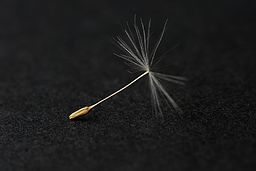I made Reb Elliot’s kippah about two years before he knew it existed. I sold Reb Elliot’s kippah to a number of people who did not know they were purchasing Reb Elliot’s kippah.
In fact, the kippah belonged to Reb Elliot — at least, in my mind.
Reb Elliot’s kippah features a delicate embroidery of a snow-white hot air balloon made of dandelions. Or rather a dandelion after flowering, when its seeds can be blown into the air by the lightest puff of wind. (For the curious among my readers: the fluffy white parachute that carries the seeds is called a pappus. This is a delightful-sounding word that ought to be said aloud as often as possible. Try it. It will make you happy inside.)

The seeds and their light, feathery-white supports are intertwined in the pattern, intersecting, and delicate. Just a few are escaping the hot air balloon. I believe an unseen breath, a tender ruach Elohim has sent them wafting into the skies and into some heavenly, unknown realm.
The hot air balloon’s basket appears to be empty, but I know it is not. That balloon is carrying secret thoughts, mystical ideas, and imaginary worlds.
Because mysterious worlds are inside Reb Elliot’s head, this is the kippah he should be wearing upon his head. Or so I thought to myself, every time I made it.
Many, many years ago, when I went to rabbi school at the ALEPH Ordination Program (AOP), I took courses on mysticism with Reb Elliot Ginsburg, Vaad member and head of the Kabbalah and Hasidut Department.
I read hasidut and a little Zohar. I read a lot of work about chassidut and Zohar so I could help myself understand.
I learned to read upside-down and sideways. This was because many of our sources had been scanned by Reb Elliot. But not in nice, neat rows. No, little three or five sentence Hebrew texts had clearly been cut out and placed on the page in wildly diverging directions. Reb Elliot peppered the pages with arrows and comments, often in different colors, too. Sometimes I had to turn the page sideways, even upside down to get to the Hebrew text that was assigned. At least once or twice I ended up in the wrong text.
No matter. That, too, was part of the hot air balloon.
Each week of each course with Reb Elliot meant entering a mental labyrinth of enigmatic passageways. Sometimes the way seemed barred to me until we met in class and either a fellow student or Reb Elliot showed me the direction I should have taken and had innocently missed.
During those semesters I learned to fly into thought realms that I had believed my pragmatic, academic self would neither understand nor care much for. I learned to love moments when I felt the ruach Elohim in those texts, gently breathing me into mystery.
Reb Elliot doesn’t just teach. He dreams. Then, he flies. You don’t know where you are going until you get there. He thinks a thought and, before you realize it, the thought has started darting about the classroom — Reb Elliot has just set it free to start its own life in the minds of the students who noticed it fly by.
Reb Elliot’s kippah has been in my Etsy shop, NotMyBrothersKippah, for two years or more. It has been purchased, I believe, by lighthearted Jewish souls in the world who would, I imagine, love to know that they are wearing Reb Elliot’s kippah (and why).
Just about a week ago, I showed Reb Elliot his kippah. I was wearing it myself. Then, I asked for his address.
It is time to send him his kippah.
This blog post is, as is likely already clear, dedicated to my friend and colleague, Rabbi Elliot Ginsburg.


